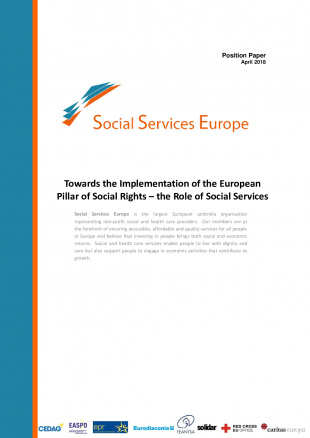Taking action on the European Pillar of Social Rights
Calling on European, national and local authorities, Social Services Europe has developed key recommendations on the implementation of the European Pillar of Social Rights based on the insight and experience of social and health service providers across Europe. Through practical examples, the paper highlights the specific role that social and health care providers already play, as well as identifying the next steps needed to successfully put the Pillar into practice.
The European Pillar of Social Rights was proclaimed at the Social Summit for Jobs and Growth in Gothenburg on 17 November 2017. To support fair and well-functioning labour markets and welfare systems, twenty key principles and rights are set out within each of these three areas to support: 1) equal opportunities and access to labour market, 2) fair working conditions, and 3) social protection and inclusion. EU Member States are expected to deliver on the principles jointly with other stakeholders.
To ensure that the Pillar is firmly established thanks to a stronger link between principles and practice on the ground, Social Services Europe recommends:
1. Building on existing good practices.
2. Enabling integration across principles.
3. Emphasising the quality of social services.
4. Enabling a social investment paradigm.
5. Investing in staff and job creation.
6. Buying services in a more social way
7. EU funds to support the implementation of the Pillar.
8. Tying the Pillar to the European semester.
9. Politically driving implementation.
10. Keeping civil society on board.
Theme
Social Services Europe is a network made up of Caritas Europa, the European Council for non-profit organisations (CEDAG), the European Association of Service providers for People with Disabilities (EASPD), the European Platform for Rehabilitation (EPR), Eurodiaconia, the European Federation of National Organisations Working with the Homeless (FEANTSA), Solidar, and the Red Cross EU Office. It aims to strengthen the profile and position of social services, and promote the role of not-for-profit social service providers in Europe.


